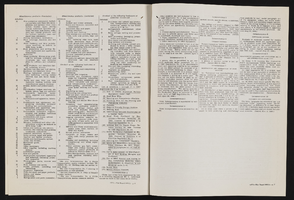Search the Special Collections and Archives Portal
Search Results
Charles Vanda Photograph Collection
Identifier
Abstract
The Charles Vanda Photograph Collection, approximately 1960 to 1988, contains black-and-white and color photographic prints with some corresponding negatives of Charles Vanda with colleagues and friends from the University of Nevada, Las Vegas (UNLV). The images depict Vanda at UNLV sporting events, graduation ceremonies, and other campus events. Also included are some images from fellow musicians, entertainers, and producers associated with Vanda.
Archival Collection
Mollie Gregory Collection of Oral Histories
Identifier
Abstract
The Mollie Gregory Collection of Oral Histories contains audio interviews and brief transcripts that focus on welfare, family, and women's issues in Nevada from 1970 to 1974. Gregory interviewed Nevada residents including Maya Miller, Ruby Duncan, and Mary Wesley, who described their lives during the anti-poverty and women's rights campaigns in the early 1970s. The collection documents views on welfare; the Equal Rights Amendment; race, discrimination, and civil rights; and political campaigns.
Archival Collection
Charles Vanda Collection
Identifier
Abstract
The Charles Vanda Collection (1955-1987) is comprised of achievement awards, plaques, and certificates that were presented to Charles Vanda throughout his career as a television and radio writer, director, and producer. Also included are newspaper clippings and articles about Charles Vanda, the performing arts, and the University of Nevada, Las Vegas (UNLV), a doctoral hood and a UNLV Runnin' Rebels jacket.
Archival Collection
International Food Service Executives Association Records
Identifier
Abstract
The International Food Service Executive Association (IFSEA) Records contain the organizational records from the IFSEA dating from 1916 to 2010. Included are meeting programs and minutes, menus, conference reports and proceedings, financial reports, newsletters, award certificates, scrapbooks, and stewards and caterers records focusing on the hospitality and food service industry. Materials are from both national and regional branches of the organization and include records from the United States military, with whom IFSEA has partnered with since the 1960s. Club artifacts and trophies are also contained in the collection.
Archival Collection
Ham Family Photograph Collection
Identifier
Abstract
The Ham Family Photograph Collection contains five photographic albums primarily featuring images of the Ham family's travels throughout the western United States and Artemus W. Ham Jr. and Betty Ham Dokter during their childhood between approximately 1900-1949. Also included is one photograph used as a Christmas greeting for the Ham family from 1981. The photographs feature locations including Cedar Breaks National Monument, Utah; Grand Canyon, Arizona; and Yosemite National Park, California. The collection also contains photographs of the Ham family at Mormon sites throughout Utah. Lastly, there are postcards and photographs of locations throughout the United States, Germany, and Japan.
Archival Collection
Stacy Smith and Sofia Allison (Nye Communities Coalition) oral history interview conducted by Kelliann Beavers and Elia Del Carmen Solano-Patricio: transcript
Date
Archival Collection
Description
From the Lincy Institute "Perspectives from the COVID-19 Pandemic" Oral History Project (MS-01178) -- Community organization interviews file.
Text

Fernando Rocha oral history interview: transcript
Date
Archival Collection
Description
Oral history interview with Fernando Rocha conducted by Nathalie Martinez and Barbara Tabach on November 13, 2019 for the Latinx Voices of Southern Nevada Oral History Project. In this interview, Fernando Rocha recalls growing up in Santa Ana, California and in Sunrise Manor in Las Vegas, Nevada. Fernando Rocha is a Mexican professional who is committed to giving back to the Latinx youth of Las Vegas. He talks about his responsibility as a translator in his family with his siblings. He credits his academic and professional success to the Clark County School District and programs such as GEAR UP and Upward Bound. After studying at Hofstra University, he came back to Las Vegas to work with Wells Fargo and is an active community member as co-founder of the Nevada Youth Coalition and work through the Association of Latino Professionals for America (ALPFA) and Nevada Promise Mentor at the College of Southern Nevada (CSN).
Text

Alan Stock oral history interview: transcript
Date
Archival Collection
Description
Oral history interview with Alan Stock conducted by Barbara Tabach on December 27, 2017 for the Remembering 1 October Oral History Project. In this interview, Alan Stock discusses moving to Las Vegas, Nevada in 1999 for his job as a radio talk show host for KXNT. Stock describes the broadcast that covered the October 1, 2017 Las Vegas mass shooting from 11 PM on that night until 9 AM the next morning. He talks about some of the calls the station received from various members of the community, including survivors of the shooting, families of those at the event, people on lockdown in the nearby hotels, doctors, and general listeners. Stock describes some of the topics discussed on the broadcast, such as what was currently happening on the Las Vegas Strip, stories of the aftermath, and the support needed from the general public. Other topics include gun control and conspiracy theories. He discusses the impact this and other shootings would have on public affairs, including tighter security in daily living and public gatherings. He compares security in the United States to security in Israel and other countries, focusing on the idea of unconcealed guns worn in public. Throughout this interview, Alan Stock explains that the radio station's goal was to provide accurate information to the public during the aftermath of the October 1, 2017 mass shooting.
Text

Transcript of interview with Peggy Huber by Greg Pushard, March 14, 1981
Date
Archival Collection
Description
On March 14th, 1981, collector Greg Pushard interviewed postmaster Peggy Huber (born March 31st, 1884 in Conway, Arkansas) in her home in Las Vegas, Nevada. This interview covers Peggy’s life in Nevada and also offers an insightful overview of Nevada’s rich history. During this interview Peggy discusses life on the ranch, mining, settlement, and the local early aboveground atomic blasts.
Text

